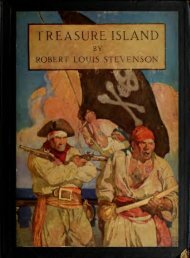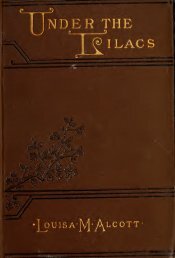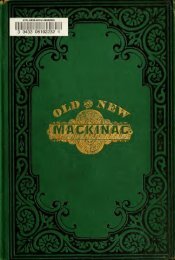- Page 2:
o-^ r\ TT'O" - 'IGIFT OFSEELEY W. M
- Page 8:
Eight Copies of the Edition de Luxe
- Page 11:
Charles de Beauharnois.
- Page 14 and 15:
Copyright, 1892,By Francis Parkman.
- Page 16 and 17:
viLOUISBOURG TAICEN.A Rash Resoluti
- Page 19:
LISTOF ILLUSTRATIONS.VOLUME TWO.Mar
- Page 23 and 24:
A HALF-CENTURY OF CONFLICT.CHAPTER
- Page 25 and 26:
1717-1723.] CHARLEVOIX. 6and questi
- Page 27 and 28:
1728-1731.] THE SIOUX MISSION. 7yea
- Page 29 and 30:
1728.] VARENNES DE LA VlfiRENDRYE.
- Page 31 and 32:
1731.] LA VJ^RENDRYE'S ENTERPRISE.
- Page 33 and 34:
^1740.] DISASTERS. 13the Woods, mur
- Page 35 and 36:
1737, 1738.] FRUITLESS INQUIRIES. 1
- Page 37 and 38:
221739.] THE MANDANS. 17caught. Thi
- Page 39 and 40:
1740.] ADVENTURES OF THE EXPLORERS.
- Page 41 and 42:
;1742.] THE MANDAN VILLAGE. 21Thus,
- Page 44 and 45:
)-^^.\^^•m.
- Page 46 and 47:
2-1 SEARCH FOR THE PACIFIC. [1742.t
- Page 48 and 49:
26 SEARCH FOR THE PACIFIC. [1742.th
- Page 50 and 51:
28 SEARCH FOR THE PACIFIC. [1742.dr
- Page 52 and 53:
30 SEARCH FOR THE PACIFIC. [1743.of
- Page 54 and 55:
32 SEARCH FOR THE PACIFIC. [1743.th
- Page 56 and 57:
34 SEARCH FOR THE PACIFIC. [1743.ha
- Page 58 and 59:
36 SEARCH FOR THE PACIFIC. [1746-17
- Page 60 and 61:
^38 SEARCH FOR THE PACIFIC. [1750.m
- Page 62 and 63:
;40 SEARCH FOR THE PACIFIC. [1751.a
- Page 64 and 65:
42 SEARCH FOR THE PACIFIC, [1761.of
- Page 66 and 67:
CHAPTER XVII.1700-1750.THE CHAIN OF
- Page 68 and 69:
46 THE CHAIN OF POSTS. [1720.that o
- Page 70 and 71:
48 THE CHAIN OF POSTS. [1720.would
- Page 72 and 73:
50 THE CHAIN OF POSTS. [1723.they w
- Page 74 and 75:
62 THE CHAIN OF POSTS. [1717-1720.F
- Page 76 and 77:
^54 THE CHAIN OF POSTS. [1727-1736.
- Page 78 and 79:
56 THE CHAIN OF POSTS. [1730, 1731.
- Page 80 and 81:
68 THE CHAIN OF POSTS. [1731-1750.d
- Page 82 and 83:
60 A MAD SCHEME. [1744.News of the
- Page 84 and 85:
62 A MAD SCHEME. [1744.Mascarene ha
- Page 86 and 87:
64 A MAD SCHEME. [1744.heads to wak
- Page 88 and 89:
66 A MAD SCHEME. [1744,1745.doubly
- Page 90 and 91:
68 A MAD SCHEME. [1745.says that he
- Page 92 and 93:
70 A MAD SCHEME. [1745.prise was di
- Page 94 and 95:
72 A MAD SCHEME. [1745.Government,
- Page 97:
' ovi/fi^ht. iSaj by ZUi2e_ Brown.
- Page 100 and 101:
74 A MAD SCHEME. [1745.of October.
- Page 102 and 103:
;76 A MAD SCHEME. [1745.thirty-two
- Page 104 and 105:
78 A MAD SCHEME. [1745.unknown to V
- Page 106 and 107:
^ "Lord and Saviour there preached
- Page 108 and 109:
82 A MAD SCHEME. [1745.lieutenant-g
- Page 110 and 111:
84 A MAD SCHEME. [1745.to the provi
- Page 112 and 113:
86 A MAD SCHEME. [1745.even should
- Page 114 and 115:
88 A MAD SCHEME. [1745.While this i
- Page 116 and 117:
CHAPTER XIX.1745.LOUISBOURGBESIEGED
- Page 118 and 119:
92 LOUISBOURG BESIEGED. [1745.in th
- Page 120 and 121:
94 LOUISBOURG BESIEGED. [1745.nine
- Page 123 and 124:
1745.] DEFENCES OF LOUISBOURG. 95si
- Page 125 and 126:
1745.] THE LANDING. 97It was about
- Page 127 and 128:
^:1745.] THE GRAND BATTERY ABANDONE
- Page 129 and 130:
1745.] FRENCH CANNON. 101he got a l
- Page 131 and 132:
1745.] THE NEW ENGLAND CAMP. 103of
- Page 133 and 134:
1745.] HARDIHOOD OF THE BESIEGERS.
- Page 135 and 136:
^1745.] IRREGULAR OPERATIONS. 107an
- Page 139 and 140:
1745.] AMATEUR GUNNERY. 109favorite
- Page 141 and 142:
1745.] RESULT OF THE FIRE. IllThe f
- Page 143 and 144: 1745.] RELIGIOUS ZEAL. 113truant di
- Page 145 and 146: 1745.] THE BURDENS OF COMMAND. 115c
- Page 147 and 148: ;CHAPTER XX.1745.LOUISBOUEG TAKEN.A
- Page 149 and 150: 1745.] THE ATTACK. 119are at work m
- Page 151 and 152: 1745.] THE ATTACK. 121the folly to
- Page 153 and 154: 1745.] THE "VIGILANT" CAPTURED. 123
- Page 155 and 156: ;1745.] MAISONFORT'S LETTER. 125gua
- Page 157 and 158: 1745.] WARREN AND PEPPERRELL. 127In
- Page 159 and 160: 1745.] EFFECT OF THE ENGLISH FIRE.
- Page 161 and 162: 1745.] CAPITULATION. 131Warren was
- Page 163 and 164: 1745.] SURRENDER. 133as the conditi
- Page 165 and 166: 1745.] PARSON MOODY. 135would "soon
- Page 167 and 168: 1745.] DISORDERS. 137"A great Noys
- Page 169 and 170: —1745.] ARIklY AND NAVY. 139been
- Page 171 and 172: 1745.] NEWS OF THE VICTORY. 141prec
- Page 173 and 174: ;1745.] PROVINCIAL OUTLAYS REPAID.
- Page 175 and 176: CHAPTER XXL1745-1747.DUG D'ANVILLE.
- Page 177 and 178: 1745.] MUTINOUS MILITIA. 147Louisbo
- Page 179 and 180: 1745.] STEPHEN WILLIAMS. 149ity,
- Page 181 and 182: 1745, 1746.] SHIRLEY'S SCHEMES. 151
- Page 183: Duke of Newcastle.
- Page 187 and 188: ^1746.] ALARM IN CANADA. 153Pennsyl
- Page 189 and 190: 1746, 1747.] BROKEN PROMISES. 155wi
- Page 191 and 192: ^1746.] D'ANVILLE'S FLEET. 157crowd
- Page 193: 1746.] D'ANVILLE'S DISASTERS. 159du
- Page 197 and 198: 1746.] DEATH OF THE VICE-ADMIRAL. 1
- Page 199 and 200: 1746.] A LAST EFFORT. 165the result
- Page 201 and 202: " ^1746.] THE STORY OF "LA PALME."
- Page 203 and 204: CHAPTER XXII.1745-1747.ACADIAN CONF
- Page 205 and 206: 1745, 1746.] ACADIAN DILEMMA. 171Br
- Page 207 and 208: ;1745,1746.] THE ACADIANS. 173fires
- Page 209 and 210: 1745,1747.] THE ACADIANS. 175not su
- Page 211 and 212: 1745-1747.] SHIRLEY AND THE ACADIAN
- Page 213 and 214: 1745-1747.] SHIRLEY'S PLANS. 179the
- Page 215 and 216: 1746,1747.] DANGER OF THE PROVINCE.
- Page 217 and 218: 1746,1747.] NOBLE AT GRAND PRE. 183
- Page 219: Saint-Lu£ de la Come.
- Page 223 and 224: ;1747.] A BOLD ENTERPRISE. 185reduc
- Page 225 and 226: 1747.] A WINTER MARCH. 187On the ne
- Page 227 and 228: 1747.] A WINTER MARCH. 189BoisWbert
- Page 229 and 230: 1747.] PLAN OF ATTACK. 191party was
- Page 231 and 232: 1747.] DEATH OF NOBLE. 193"Friends,
- Page 233: Daniel Hyacinthe Marie Lienard de B
- Page 238 and 239: "196 ACADIAN CONFLICTS. [1747.when
- Page 240 and 241: 198 ACADIAN CONFLICTS. [1747.about
- Page 242 and 243: 200 ACADIAN CONFLICTS. [1747.La Cor
- Page 244 and 245:
^202 ACADIAN CONFLICTS, [1747.They
- Page 246 and 247:
204 ACADIAN CONFLICTS. [1747.gave r
- Page 248 and 249:
206 WAR AND POLITICS. [1740-1747.th
- Page 250 and 251:
;208 WAR AND POLITICS. [1745-1747.a
- Page 252 and 253:
210 WAR AND POLITICS. [1745-1747.Th
- Page 254 and 255:
212 WAR AND POLITICS. [1746-1748.ge
- Page 256 and 257:
214 WAR AND POLITICS. [1746.frontie
- Page 258 and 259:
216 WAR AND POLITICS. [1746.charred
- Page 260 and 261:
218 WAR AND POLITICS. [1740-1746.le
- Page 262 and 263:
220 WAR AND POLITICS. [1743-1748.of
- Page 264 and 265:
222 WAR AND POLITICS. [1747.— whi
- Page 266 and 267:
224 WAR AND POLITICS. [1747.or trun
- Page 268 and 269:
226 WAR AND POLITICS. [1747.Wisely
- Page 270 and 271:
228 WAR AND POLITICS. [1747.had but
- Page 272 and 273:
CHAPTER XXIV.1745-1748.FORT MASSACH
- Page 274 and 275:
232 FORT MASSACHUSETTS. [1745, 1746
- Page 276 and 277:
;234 FORT MASSACHUSETTS. [1746.Appe
- Page 278 and 279:
236 FORT MASSACHUSETTS. [1746.was i
- Page 280 and 281:
^238 FORT MASSACHUSETTS. [1746.De M
- Page 282 and 283:
—:240 FORT MASSACHUSETTS. [1746.c
- Page 284 and 285:
242 FORT MASSACHUSETTS. [1746.who h
- Page 286 and 287:
244 FORT MASSACHUSETTS. [1746.Serge
- Page 288 and 289:
246 FORT MASSACHUSETTS. [1746.cloud
- Page 290 and 291:
248 FORT MASSACHUSETTS. [1746.able
- Page 292 and 293:
250 FORT MASSACHUSETTS. [1746.them
- Page 294 and 295:
252 FORT MASSACHUSETTS. [1746.had g
- Page 296 and 297:
254 FORT MASSACHUSETTS. [1746."Rive
- Page 298 and 299:
256 FORT MASSACHUSETTS. [1748.tendi
- Page 300 and 301:
258 APPENDIX.tra toujours jusqu'a c
- Page 302 and 303:
260 APPENDIX.L'Acadie, Etechemains
- Page 304 and 305:
262 APPENDIX." 2° Pour etre en Eta
- Page 306 and 307:
264 APPENDIX.meme on perd ce que L'
- Page 308 and 309:
266 APPENDIX.pez, ou bien leur rend
- Page 310 and 311:
268 APPENDIX." 2° Que les Anglois
- Page 312 and 313:
270 APPENDIX.Reponsb." Non parce qu
- Page 314 and 315:
272 APPENDIX.dela de ces 20 lieues
- Page 316 and 317:
274 APPENDIX.a sa signature En la d
- Page 318 and 319:
276 APPENDIX.menter quelques autres
- Page 320 and 321:
:278 APPENDIX.les regies. On en a d
- Page 322 and 323:
280 APPENDIX." Le dix-huit nous vim
- Page 324 and 325:
282 APPENDIX.tout ce que les intere
- Page 326 and 327:
284 APPENDIX.du six an sept, fut ta
- Page 328 and 329:
286 APPENDIX." A fin de reussir d'u
- Page 330 and 331:
288 APPENDIX.et drivait vers la par
- Page 332 and 333:
290 APPENDIX.etoient les plus proch
- Page 334 and 335:
292 APPENDIX." Depuis la retraite d
- Page 336 and 337:
294 APPENDIX." Comme ils finissaien
- Page 338 and 339:
296 APPENDIX.mon maitre m'ayant con
- Page 340 and 341:
298 APPENDIX."L'ennemy s'etant empa
- Page 342 and 343:
300 APPENDIX.ete repousses deux foi
- Page 344 and 345:
302 APPENDIX.battoit le flanc droit
- Page 346 and 347:
304 APPENDIX." Les ennemis ayant to
- Page 348 and 349:
306 APPENDIX.bloquoient le port, Ce
- Page 350 and 351:
308 APPENDIX.a monsieur Verrier, in
- Page 352 and 353:
310 APPENDIX.leur embarquement pour
- Page 354 and 355:
312 APPENDIX." II ^toit colonel gen
- Page 356 and 357:
314 APPENDIX.Artillery in three wee
- Page 358 and 359:
;316 APPENDIX.with Stores from Cana
- Page 360 and 361:
318 APPENDIX.fair way of being serv
- Page 362 and 363:
320 APPENDIX.Shirley to Newcastle,
- Page 364 and 365:
;322 APPENDIX.Shirley to Newcastle,
- Page 366 and 367:
324 APPENDIX.great measure become t
- Page 368 and 369:
326 APPENDIX.tents of which are con
- Page 370 and 371:
328 APPENDIX.I sent an Express Boat
- Page 372 and 373:
330 APPENDIX.Shiblet to Newcastle,
- Page 374 and 375:
332 APPENDIX.increas'd at Menis; th
- Page 376 and 377:
334 APPENDIX.goes to England in the
- Page 378 and 379:
336 APPENDIX."As the Sentiments, wh
- Page 380 and 381:
338 APPENDIX.ofUtrecht, and making
- Page 382 and 383:
340 APPENDIX.live without the Walls
- Page 384 and 385:
342 APPENDIX.iSTorthern Colonies, t
- Page 386 and 387:
344 APPENDIX.habitants ofSchiegnect
- Page 388 and 389:
346 APPENDIX.oners just Arriv'd fro
- Page 390 and 391:
348 APPENDIX.Newcastle to Shirley,
- Page 392 and 393:
350 APPENDIX.Majesty's Commands con
- Page 394 and 395:
352 APPENDIX.Shirley to Newcastle,
- Page 396 and 397:
354 APPENDIX.mand of the late Lieut
- Page 398 and 399:
856 APPENDIX.Government in it, & th
- Page 401:
INDEX.
- Page 404 and 405:
;;.362 INDEX.English rivals for, i.
- Page 406 and 407:
364 INDEX.i. 252 ; the interview wi
- Page 408 and 409:
;366 INDEX.Bieuville, Le Moyne de,
- Page 410 and 411:
.368 INDEX.Bruyas, the Jesuit, i. 1
- Page 412 and 413:
;370 INDEX.son, i. 141 ; on the pes
- Page 414 and 415:
;372 INDEX.Covenanters, the, i. 193
- Page 416 and 417:
;374 INDEX.enemy begs for mercy, i.
- Page 418 and 419:
;;376 INDEX.except those France may
- Page 420 and 421:
378 INDEX.French of Acadia, the, tr
- Page 422 and 423:
;;380 INDEX.Guillanme le Sincbre, i
- Page 424 and 425:
;382 INDEX.colony in Louisiana, i.
- Page 426 and 427:
384 INDEX.Kalm, the Swedish natural
- Page 428 and 429:
ii. 167.La Perelle, ii. 132, 303.La
- Page 430 and 431:
;;388 INDEX.Littlefield, Edmund, ho
- Page 432 and 433:
;,;390 INDEX.Mandans, the, ii. 15 ;
- Page 434 and 435:
;892 INDEX.Maurepas, Count de, memo
- Page 436 and 437:
;;394 INDEX.Morpain, Captain, oppos
- Page 438 and 439:
;;396 INDEX.to allow the French to
- Page 440 and 441:
;398 INDEX.Ouacos, the, i. 357.Ousl
- Page 442 and 443:
;400 INDEX.Colonel March attacks, i
- Page 444 and 445:
;402 INDEX.Protestants, the, exclud
- Page 446 and 447:
;404 INDEX.Ei
- Page 448 and 449:
;St. Paul's Bay, i. 25.St, Peter, I
- Page 450 and 451:
;;408 INDEX.orderin Lonisbourg, ii.
- Page 452 and 453:
;410 INDEX.between the " Bastonnais
- Page 454 and 455:
;412 INDEX.Olson's camp, i. 143 ; P
- Page 456 and 457:
;414 INDEX.49 ; attacked by the Fre
- Page 458:
416 INDEX.Woods, Sergeant, withLove
















